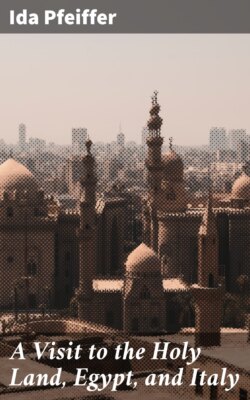Читать книгу A Visit to the Holy Land, Egypt, and Italy - Ida Pfeiffer - Страница 11
На сайте Литреса книга снята с продажи.
March 29th.
ОглавлениеTable of Contents
After having completely refreshed ourselves at the good inn called the “Golden Stag,” we this morning embarked on a new craft, the Saturnus, which is only covered in overhead, and is open on all sides.
So soon as a traveller has stepped upon this vessel he is looked upon as unclean, and may not go on shore without keeping quarantine: an officer accompanied us as far as Galatz.
Immediately below Alt-Orsova we entirely quit the Austrian territory.
We are now brought nearer every moment to the most dangerous part of the river, the “Iron Gate,” called by the Turks Demir kaju. Half an hour before we reached the spot, the rushing sound of the water announced the perilous proximity. Numerous reefs of rocks here traverse the stream, and the current runs eddying among them.
We passed this dangerous place in about fifteen minutes. Here, at the Iron Gate, the high tide befriended us, as it did at the former falls.
I found these falls, and indeed almost every thing we passed, far below the anticipations I had formed from reading descriptions, frequently of great poetic beauty. I wish to represent every thing as I found it, as it appeared before my eyes; without adornment indeed, but truly.
After passing the Iron Gate we come to a village, in the neighbourhood of which some fragments of the Trajan’s Bridge can be discerned at low water.
The country now becomes flatter, particularly on the left bank, where extend the immense plains of Wallachia, and the eye finds no object on which it can rest. On the right hand rise terrace-like rows of hills and mountains, and the background is bounded by the sharply-defined lines of the Balkan range, rendered celebrated by the passage of the Russians in 1829. The villages, scattered thinly along the banks, become more and more miserable; they rather resemble stables for cattle than human dwellings. The beasts remain in the open fields, though the climate does not appear to be much milder than with us in Austria; for to-day, nearly at the beginning of April, the thermometer stood one degree below zero, and yesterday we had only five degrees of warmth (reckoning by Reaumur). {30}
The expeditious and easy manner in which cattle are here declared to be free from the plague also struck me as remarkable. When the creatures are brought from an infected place to one pronounced healthy, the ship is brought to some forty or fifty paces from the shore, and each animal is thrown into the water and driven towards the bank, where people are waiting to receive it. After this simple operation the beasts are considered free from infectious matter.
Cattle-rearing seems to be here carried on to a considerable extent. Everywhere I noticed large herds of horned beasts and many buffaloes. Numerous flocks of goats and sheep also appear.
On the Saturnus we travelled at the most for two hours, after which we embarked, opposite the fortress of Fetislav, on board the steamer Zriny.
At five o’clock in the evening we passed the fortress of Widdin, opposite which we stopped, in the neighbourhood of the town of Callafat. It was intended merely to land goods here, and then to proceed immediately on our voyage; but the agent was nowhere to be found, and so we poor travellers were made the victims of this carelessness, and compelled to remain here at anchor all night.
